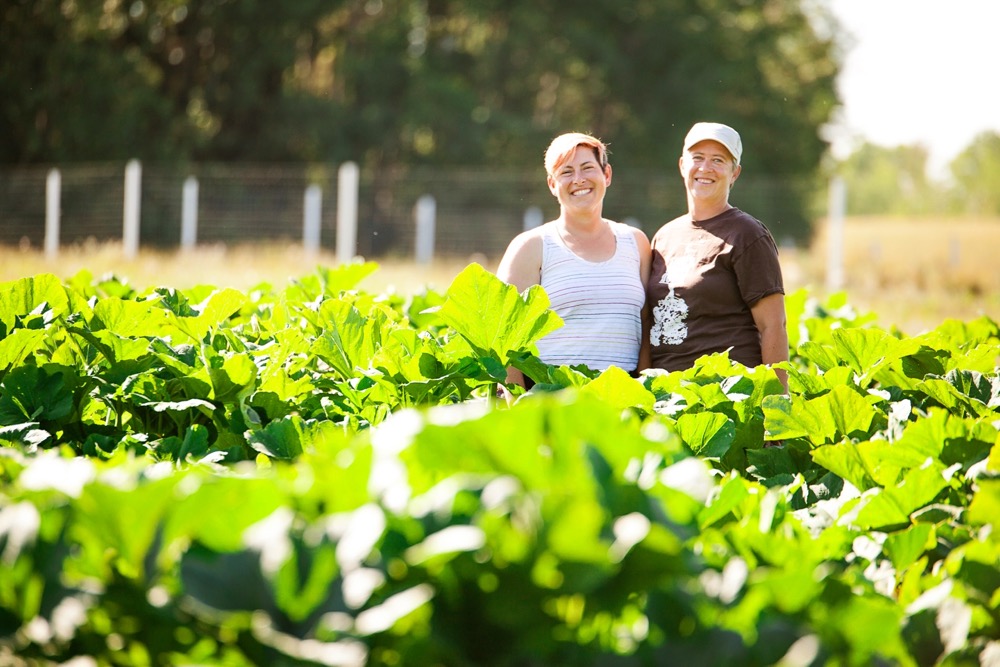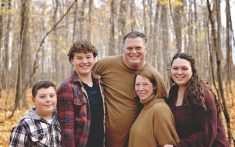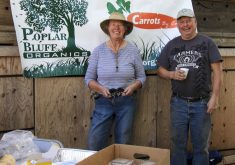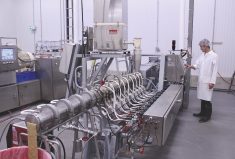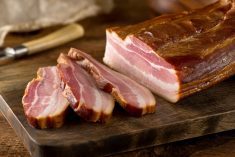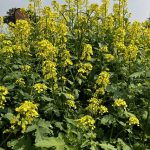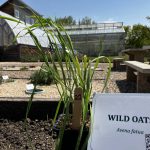Now 33, Otis Bell admits he’s outside the mainstream of agriculture. Growing up in Seattle, Bell next lived in Olympia, where he got his first taste of growing plants and gardening, and where he decided to get more directly involved with farming.
“I think being queer made me take a step out of some of the normal streams that people just flow into,” says Bell. “I started to look at the world through a critical lens, looking to really be part of a positive movement of life that was going to sustain us in a healthy community, in a healthy way.”
Read Also

‘No agenda, no attenda’: How to professionalize your family farm meetings
Establishing meeting ground rules can help a farm family find ways to communicate that work for the business and the family.
That’s why he and his Canadian partner moved to Vancouver Island last year, where they had discovered Saanich Organics, near Victoria.
“I became a resident here and chose this area, because it has a city I could study acupuncture in,” said Bell. “But it also has a farm community accessible to the city. Balance of those two worlds is important to me.”
Saanich Organics is a collective of three women, each of whom has their own heterosexual family. The three run farms close together and market their food co-operatively. They also sell for a handful of other small enterprises, mostly run by women.
“They are very feminist,” says Bell. “Two friends of mine who identify as transgender and gender queer were working for them and told me what great allies they are. They don’t just tolerate queerness.They celebrate it and really invite it.
“It’s incredible to find common ground, a place where I can feel truly liberated and grow strong.”
Robin Tunnicliff is one of the three women from Saanich Organics. Her farm is located half an hour west of Victoria, where she grows a variety of vegetables year round. Her output is distributed on the island to stores, farmers’ markets, and directly to customers.
A few years ago, Tunnicliff recalls, she hired a lesbian woman as farm manager. That manager then hired from her circle of friends.
“Before we knew it, we had an almost entirely queer workforce, which was really fun,” says Tunnicliff.

There’s something in it for both sides, Tunnicliff says. She sees some of the struggles and issues that some of her staff have faced, and she likens it to a sort of post-traumatic stress from having been born different from the norm and subsequently being marginalized.
“I think the hard work and positivity that come from nurturing plants is therapeutic to them,” says Tunnicliff. “Farming is different. It can be a solitary activity where you’re always on your own on land, and it can also be an intense time pressure getting ready for harvest.”
But she also sees benefits for the farm. “Farming and distribution are tough nuts to crack. It costs a lot of money to grow food well,” Tunnicliff says. “I really welcome new subsets into agriculture. Queer thinking is different. It comes from a creative side. Queers are different in the way that they approach problems.”
“We definitely benefited from having a queer staff,” Tunnicliff adds. “I’ve seen them marketing in different ways that I hadn’t thought about, getting food into the urban core. I don’t know that it has to do with being queer or if it’s just because they are exceptional individuals.”
It brings a smile to Tunnicliff’s face when her employees dress up to go to work on the farm… and then it gives her opportunity for reflection.
“One time, one of the farmhands who was biologically female just really wanted to work with his shirt off,” said Tunnicliff. “I hadn’t ever thought about what a challenge that might be. We just have a lot of experiences on the farm where it gave me a lot of opportunity to reflect on my privilege of fitting into the norm. It was humbling.”
Still, a lot gets accepted simply by having an employee who shows up to work with a positive attitude, a willingness to work, and the dedication it takes to get the job done.
“I think there’s room in agriculture for willing hands, hearts, and minds,” says Tunnicliff.
“There are so few people willing to work really hard that when these workers do appear, it really moves the farmers,” Tunnicliff says. “That can go a long way to having people accepted and welcomed into a community where they haven’t been before.
“When I come across a confident, happy queer person, I think I’d definitely hire them over a straight farmhand, because I know that, for them to want to work in a non-traditional career, for them to get where they are, has taken a lot.”
But it’s also important to let LGBT employees be themselves, she adds. “I remember when they suggested Dress Up Fridays, I worried about how very much work we had to get done. But, it didn’t take any more time out of their days and it added tons of spirit to the farm atmosphere.”
Tunnicliff would be the first to agree that sometimes conversation with LGBT staff can end up in places you may be uncomfortable with, but she has learned it is important to “let people be free” and know that all workplaces are equal.
“It doesn’t matter to us how you dress at the farm as long as you can get the rows hoed and the carrots binned,” Tunnicliff says. “That said, we have a delivery boy right now who is a flamboyant cross-dresser.” Since he is the face of the operation, Tunnicliff had to create a dress code for him. But otherwise, it’s pretty much a free-for-all, within the spirit of getting the work done.
Farmers’ kids and LGBT staff
According to Tunnicliff, the farm kids have had an easier transition time than the farmers themselves. “We just said, ‘Look, Jessica was a girl and now is a boy, and we’re going to call him Dennis,” said Tunnicliff. “It wasn’t an issue. There were a couple of questions, but the kids are way better able to accept it than adults.”
Tunnicliff believes it is good for kids to see this, since the more LGBT individuals become empowered and accepted, the more they will be working the land. “I think it’s good to build acceptance into our world,” she says.
There are three kids working on Tunnicliff’s farm who came of age right when the farm had hired the LGBT staff. These three boys all went to the Pride Parade and, she said, “They couldn’t be more straight.
“Good people are wonderful to have around,” Tunnicliff says. “It doesn’t matter if they are queer or not.”
The prairies
Near Onoway, about a half-hour northwest of Edmonton, Dawn Boileau and her wife, Kate Hook, built Sunrise Gardens.
It’s rural Canada, which means it isn’t exactly the kind of place that gets automatically pictured as gay friendly. But times are changing on the back roads too.
“When I was talking to Kate (Hook) about this interview, we could only think of two times we’d ever had someone not buy our stuff because they found out we were married to each other,” says Boileau. “Both times, they were elderly and religious.
“I’ve experienced a lot more issues about being female than about being queer,” Boileau continues. “Around here, if you’re a woman, you’re the farmer’s wife.”
Hook and Boileau work with four full-time employees to supply vegetables in season, as well as some out of season in cold frames and as shoots, micro-greens, and wheatgrass year round, and they sell their produce at the Old Strathcona Farmers’ Market year round, as well as at Booster Juice and other sellers.
They also find the community to be accepting of them as a couple, says Boileau.
Yet Boileau feels that this is partly because the farming community itself isn’t that tight. If you have under 1,000 acres in Alberta, you’re considered a small farm and “you don’t really count,” Boileau says. “We’re generally dismissed by the farming community.”
Even at farmers’ markets, however, the first question Boileau or her partner hear is, “Where’s your husband?”

Just after Hook and Boileau were married and shared the news with some of their regular customers, the question they heard in reply was, “To whom?”
It was a question they learned to answer very directly, with a, “To each other,” says Boileau. “We’re very comfortable and very free with who we are.”
Besides, Boileau says, when it comes to farming, and to treating people with respect on the farm, it comes down to the quality of your work. “There are a lot more important qualities than sexual orientation.”
On your farm
Across the country, labour is in short supply. For farmers, in fact, it can be the greatest threat to their ability to grow.
So, should you be promoting your farm as a place for LGBTs to work?
“Farming tends to be represented so homogenously,” says Moss Dance, an LGBT farmer from Vancouver Island who helped form an LGBT support group for farmers and farm workers there called The Rainbow Chard Collective.
“When I see images of farmers in the media, it’s often people who are male, and a farm family is usually a heterosexual couple with some children, often also white,” Dance says. “Our whole thing was to redefine the family farm… to insert food for thought.
“In some farming communities, it’s obvious I don’t fit,” says Dance. “But we want other queers around the country to know that farming is an option for them.”
Although Dance has never experienced negative comments about her being LGBT, she has definitely felt it on a subtle level.
Dance recommends that farm employers be “open to the possibility that a good person for your farm is also queer. That is a great start.”
Then, promote the fact that you’re open to having an LGBT person apply for work with you. “The best way to allow this person to even consider you as an employer is to list in your wanted ad that you own a progressive farm that would welcome diversity in its employees.
“I would think that any employer would want to cast a wide net to catch all kinds of diversity. I really see the value in having people with diverse ideas, life experiences, and backgrounds on the farm. Everybody brings specific gifts. It’s less about attracting diverse sexualities, but more about attracting diverse profiles.”

